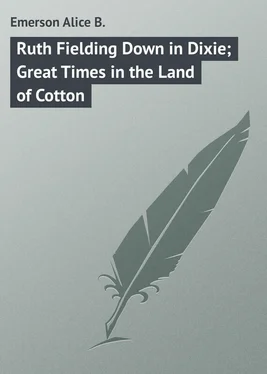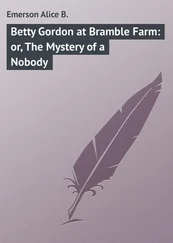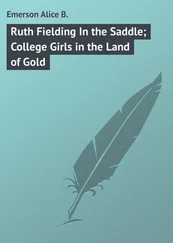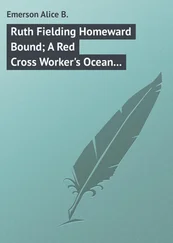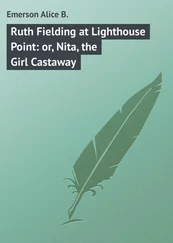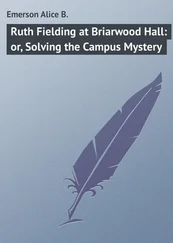Alice Emerson - Ruth Fielding Down in Dixie; Great Times in the Land of Cotton
Здесь есть возможность читать онлайн «Alice Emerson - Ruth Fielding Down in Dixie; Great Times in the Land of Cotton» — ознакомительный отрывок электронной книги совершенно бесплатно, а после прочтения отрывка купить полную версию. В некоторых случаях можно слушать аудио, скачать через торрент в формате fb2 и присутствует краткое содержание. Жанр: foreign_language, foreign_prose, на английском языке. Описание произведения, (предисловие) а так же отзывы посетителей доступны на портале библиотеки ЛибКат.
- Название:Ruth Fielding Down in Dixie; Great Times in the Land of Cotton
- Автор:
- Жанр:
- Год:неизвестен
- ISBN:нет данных
- Рейтинг книги:5 / 5. Голосов: 1
-
Избранное:Добавить в избранное
- Отзывы:
-
Ваша оценка:
- 100
- 1
- 2
- 3
- 4
- 5
Ruth Fielding Down in Dixie; Great Times in the Land of Cotton: краткое содержание, описание и аннотация
Предлагаем к чтению аннотацию, описание, краткое содержание или предисловие (зависит от того, что написал сам автор книги «Ruth Fielding Down in Dixie; Great Times in the Land of Cotton»). Если вы не нашли необходимую информацию о книге — напишите в комментариях, мы постараемся отыскать её.
Ruth Fielding Down in Dixie; Great Times in the Land of Cotton — читать онлайн ознакомительный отрывок
Ниже представлен текст книги, разбитый по страницам. Система сохранения места последней прочитанной страницы, позволяет с удобством читать онлайн бесплатно книгу «Ruth Fielding Down in Dixie; Great Times in the Land of Cotton», без необходимости каждый раз заново искать на чём Вы остановились. Поставьте закладку, и сможете в любой момент перейти на страницу, на которой закончили чтение.
Интервал:
Закладка:
“And I believe she would,” gasped Helen, as she and Ruth almost ran back up to the saloon deck again. “Goodness! she is worse than Miss Brokaw ever thought of being – and we thought her pretty sharp at times.”
“I wonder what and who the woman is,” Ruth murmured. “I am glad she is nobody whom I have to know.”
“Hope we have seen the last of the hateful old thing!”
But they had not. As the girls walked forward through the saloon and approached the spot where they had sat watching the mysterious woman with the short hair and the shorter temper, a youth got up from one of the seats and strolled out upon the deck ahead of them. Ruth started, and turned to look at Helen.
“My dear!” she said. “Did you see that ?”
“Don’t point out any other mysteries to me – please!” cried Helen. “We’ll get into a worse pickle.”
“But did you see that boy?” insisted Ruth.
“No. I’m not looking for boys.”
“Neither am I,” Ruth returned. “But I could not help seeing how much that one resembled Curly Smith.”
“Dear me! You certainly have Henry Smith on the brain,” cried Helen.
“Well, I can’t help thinking of the poor boy. I hope we shall hear from his grandmother again. I am going to write and mail the letter just as soon as we reach Old Point Comfort.”
The girls had walked slowly on, past the seat where the odd looking woman whom they had watched had sat down to examine the contents of her handbag. There were few other passengers about, for as the evening closed in almost everybody had sought the open deck.
Suddenly, from behind them, came a sound which seemed to be a cross between a steam whistle gone mad and the clucking of an excited hen. Ruth and Helen turned in amazement and saw the lank, mannish figure of the strange woman flying up the saloon.
“Stop them! Come back! My ticket!” were the words which finally became coherent as the strange individual reached the vicinity of the girl chums. An officer who was passing through happened to be right beside the two girls when the excited woman reached them.
She apparently had the intention of seizing hold upon Ruth and Helen, and the friends, startled, shrank back. The ship’s officer promptly stepped in between the girls and the excited person with the short hair.
“Wait a moment, madam,” he said sharply. “What is it all about?”
“My ticket!” cried the short-haired woman, glaring through her spectacles at Ruth and Helen.
“Your ticket?” said the officer. “What about it?”
“It isn’t there!” and she pointed tragically to the seat on which she had previously rested.
“Did you leave it there?” queried the officer, guessing at the reason for her excitement.
“I just did, sir!” snapped the stern woman.
“Your ticket for your trip to Norfolk?”
“No, it isn’t. It’s my ticket for my railroad trip from Norfolk to Charleston. I had it folded in one of those Southern Railroad Company’s folders. And now it isn’t in my bag.”
“Well?” said the officer calmly. “I apprehend that you left the folder on this seat – or think you did?”
“I know I did,” declared the excited woman. “Those girls were following me around in a most impudent way; and they were right here when I got up and forgot that folder.”
“The inference being, then,” went on the officer, “that they took the folder and the ticket?”
“Yes, sir, I am convinced they did just that,” declared the woman, glaring at the horrified Ruth and Helen.
Said the latter, angrily: “Why, the mean old thing! Who ever heard the like?”
“Oh, I know girls through and through!” snapped the strange woman. “I should think I ought to by this time – after fifteen years of dealing with the minxes. I could see that those two were sly and untrustworthy, the instant I saw them.”
“Oh!” exclaimed Ruth.
“Nasty cat!” muttered Helen.
The officer was not greatly impressed. “Have you any real evidence connecting these young ladies with the loss of your ticket?” he asked.
“I say it’s stolen!” cried the sharp-voiced one.
“And it may, instead, have been picked up, folder and all, by a quite different party. Perhaps the purser already has your lost ticket – ”
At that moment the purser himself appeared, coming up the saloon. Behind him were two of the under stewards burdened with magnificent bunches of roses. A soft voice appealed at Ruth’s elbow:
“If missy jes’ let me take her stateroom key, den all dem roses be ‘ranged in dar mos’ skillful – ya-as’m; mos’ skillful.”
“Why! did you ever!” gasped Helen, amazed.
“Those are never for us ?” cried Ruth.
“You are Miss Cameron?” asked the smiling purser of Ruth’s chum. “These flowers came at the last moment by express for you and your friend. In getting under way they were overlooked; but the head stewardess opened the box and rearranged the roses, and I am sure they have not been hurt. Here is the card – Mr. Thomas Cameron’s compliments.”
“Oh, the dear!” cried Helen, clasping her hands.
“ Those were the roses you thought he sent to Hazel Gray,” whispered Ruth sharply.
“So they are!” cried Helen. “What a dunce I was. Of course, old Tom would not forget us. He’s a good, good boy!”
She ran ahead to the stateroom. Ruth turned to see what had happened to the woman who thought they had taken her railroad ticket. The deck officer had turned her over to the purser and it was evident that the latter was in for an unpleasant quarter of an hour.
The roses seemed fairly to fill the stateroom, there were so many of them. The girls preferred to arrange them themselves; so the three porters left after having been tipped.
The chums opened the blind again so that they could look out across the water at the Jersey shore. Sandy Hook was now far behind them. Long Branch and the neighboring seaside resorts were likewise passed.
The girls watched the shore with its ever varying scenes until past six o’clock and many of the passengers had gone into the dining saloon. Ruth and Helen finally went, too. They saw nothing of the unpleasant woman whose ire had been so roused against them; but after they came up from dinner, and the orchestra was playing, and the Brigantine Buoy was just off the port bow, the girls saw somebody else who began to interest them deeply.
The moon was coming up, and its silvery rays whitened everything upon deck. The girls sat for a while in the open stern deck watching the water and the lights. It was very beautiful indeed.
It was Helen who first noticed the figure near, with his back to them and with his head upon the arm that rested on the steamer’s rail. She nudged Ruth.
“See him?” she whispered. “That’s the boy who you said looked like Henry Smith. See his curly hair?”
“Oh, Helen!” gasped Ruth, a thought stabbing her suddenly. “Suppose it is?”
“Suppose it is what?”
“Suppose it should be Curly whom the police were after? You know, that dressed-up boy – if it was he we saw on the dock – had curly hair.”
“So he had! I forgot that when we were trailing that queer old maid,” chuckled Helen.
“This is no laughing matter, dear,” whispered Ruth, watching the curly-haired boy closely. “Having gotten rid of his disguise, there was no reason why that boy should not stay aboard the steamboat.”
“No; I suppose not,” admitted Helen, rather puzzled.
“And if it is Curly – ”
“Oh, goodness me! we don’t even know that Henry Smith has run away!” exclaimed Helen.
Instantly the boy near them started. He rose and clung to the rail for a moment. But he did not look back at the two girls.
Читать дальшеИнтервал:
Закладка:
Похожие книги на «Ruth Fielding Down in Dixie; Great Times in the Land of Cotton»
Представляем Вашему вниманию похожие книги на «Ruth Fielding Down in Dixie; Great Times in the Land of Cotton» списком для выбора. Мы отобрали схожую по названию и смыслу литературу в надежде предоставить читателям больше вариантов отыскать новые, интересные, ещё непрочитанные произведения.
Обсуждение, отзывы о книге «Ruth Fielding Down in Dixie; Great Times in the Land of Cotton» и просто собственные мнения читателей. Оставьте ваши комментарии, напишите, что Вы думаете о произведении, его смысле или главных героях. Укажите что конкретно понравилось, а что нет, и почему Вы так считаете.
